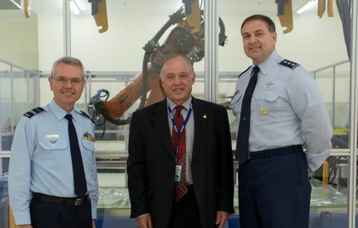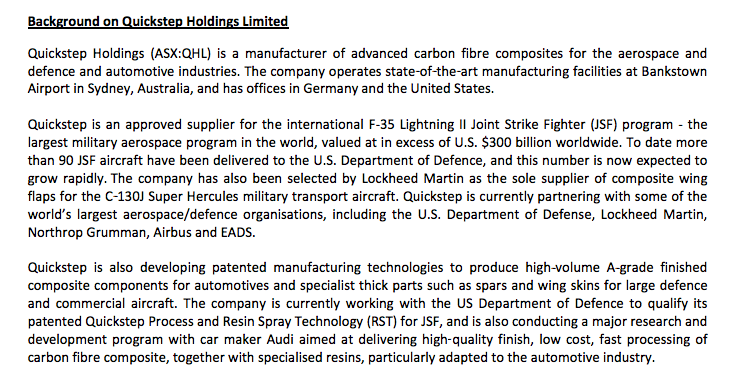2014-03-27 By Robbin Laird
During my visit to Australia in early March, I had a chance to talk with some of the F-35 suppliers in Australia.
When one frames this subject, the term “suppliers” to a nation’s F-35 program suggests a legacy approach, whereby one is assembling an aircraft in country and for the life of that engagement one is supplying parts for that single nation’s aircraft.
This would mean for Australia, that a relatively small number of aircraft would be produced, and supply and support houses would then engage in the production or assembly of those aircraft, and when that production run or acquisition run was over, that would be it except for whatever role the supplier might have in maintaining the aircraft.
The F-35 program has a very different approach.
It is designed for a long-term production cycle for the engagement of a network of global suppliers, and participants in the program and rather than producing simply for their own nation’s planes but for the global production run and sustainment effort.
This means as well that there is the possibility of having multiple suppliers for the aircraft, which ensures that competition is built into the supply chain driving down cost, and raising reliability rates on parts to be supplied to the aircraft over time. This means that the type of companies you can attract to the program see the point of investing in the program for the long haul; and these are clearly going to be among the best suppliers, and more than willing to meet the competition globally.
In turn, the long production run of the aircraft allows a company to wish to participate and to invest because planning can be for the longer term and not just a decade or less engagement in a smaller or mid-size nation’s acquisition cycle.
Such a company is the Australian company, Quickstep Holdings Limited, the manufacturer of high-grade carbon fiber components. In a discussion with the CEO, Philippe Odouard, the company and its approach to the F-35 program was the focus of attention.
Question: What is your background?
Odouard: I have been in Australia for more than 30 years. I came to Australia with Sagem and then moved to what is now Thales and had an opportunity to work with a new Australian startup, which is now Quickstep. The founder of the company had developed some very innovative solutions for composite manufacturing, and the innovative business climate in Australia has allowed the company to grow. We are focused on global exports and currently have state of the art manufacturing facilities at Bankstown Airport in Sydney and have offices in Germany and the United States.

Question: What is the approach of the company to the market?
Odouard: We are involved in the F-35 program as well as working with Lockheed Martin on the C-130J as well as with Boeing, Airbus, and Sikorsky.
But we are not just involved with aerospace.
We see the future for composites in the automobile manufacturing sector as a significant growth industry. To meet the mandated environmental standards, which are getting more stringent in many countries, the weight of vehicles needs to be reduced along with shaping new propulsion plant technologies. Composite manufacturing is clearly a key element of building capabilities to reduce vehicle weight.
The military market is important for us because we are a first world developer and producer. The military market demands high end products with significant reliability built in. This is an area where a high end producer can have an advantage over the lower cost countries like China.
Question: How do you see the F-35 program and its impact on your company?
Odouard: We see the program as the military equivalent of a civilian aerospace program such as the A320 or the Boeing 737. It is a program with a long production run and global reach and allows us to engage in a global production engagement.
With the F-35 program, we are supplying key composite elements to Northrop Grumman, which is the major producer of the fuselage, and whose new plant is a state of the art automated manufacturing facility.
A measure of the recognition we receive from Northrop is that the President of Northrop Grumman Aerospace Systems came to Australia for the opening of our new facility in Bankstown, Australia.
http://investor.northropgrumman.com/phoenix.zhtml?c=112386&p=irol-newsArticle&id=1707643
Indeed, during the opening ceremonies we had a video link back to Los Angeles where the Northrop team participated virtually in the opening which symbolizes the approach of working closely together to deliver reliable parts.
In fact, we compete within the supply chain to provide high quality parts and have been consistently recognized by Northrop to be at the head of the class.
Question: Why Australia for your company?
Odouard: The simple answer is that the inventor of the technology was Australian. We moved from Perth to Sydney to facilitate the upsurge in production for the global market.
The Australian government in its approach to defense products recognizes that it does not have a large domestic infrastructure for defense production and is looking for companies that can position themselves for a global engagement. The approach is to amortize cost by not simply building up a domestic industry, which needs to be fed by domestic acquisition, but rather one that can work effectively abroad and help the Australian government amortize the cost of its core acquisitions.
The business model is very different here from what Brazil has done with SAAB. After the Gripen acquisition is over it is over. You are not going to get exports and your growth abilities are limited.
In the F-35 case, our investment allows us to participate in a global supply chain for a global aircraft. It also allows you to shape a core team of developers and manufacturers and to take that core team into the global marketplace and to operate in adjacent fields as well. The investment in the F-35 engagement is a real trigger to value from the Australian government’s point of view. It is not a dead end street.
Recently, the head of the F-35 program came to our facility and was pleased to see our efforts at shaping new approaches to production and to affordability driven by technological innovations. We believe that the global competitiveness built into the program will be a real benefit both for us and for the program.
Editor’s Note: The Quickstep website is a good guide to the approach of the company and its global engagement.
The video below by the CEO provides a short overview to the company and its basic approach.


